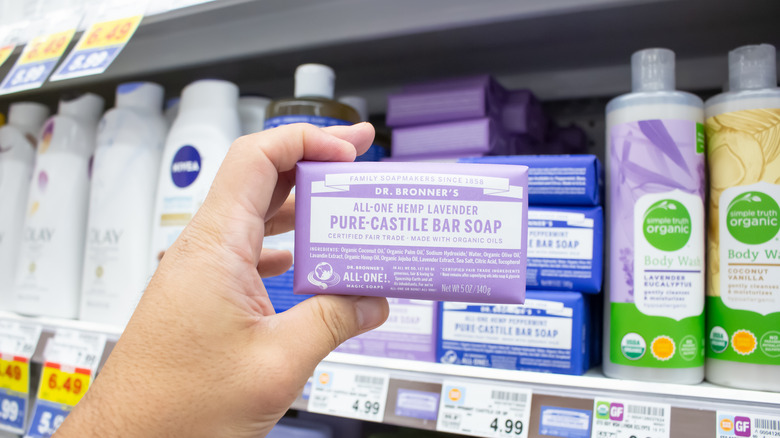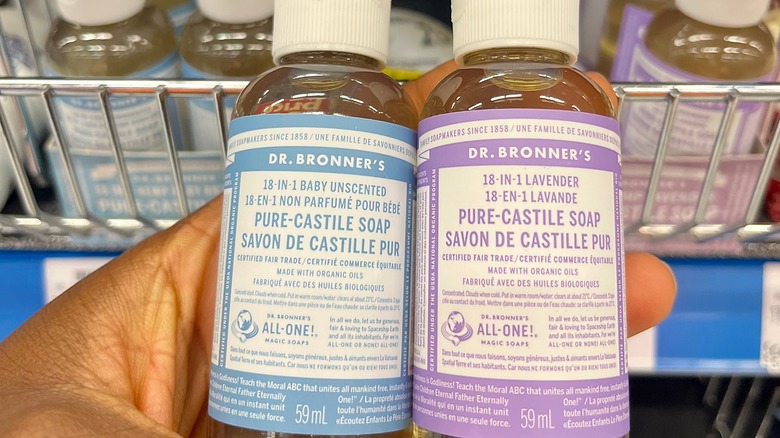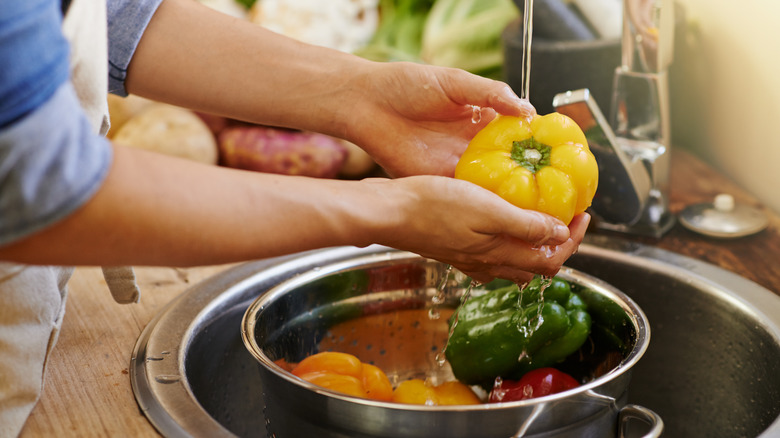Yes, Dr Bronner's Soap Is Perfectly Safe To Wash Produce With
Washing produce is an essential food-handling process that promotes food safety and clean eating habits. Whether it's fruit, veggies, roots, or herbs, your grocery store produce is probably dirtier than you think. Because edible plants grow from the ground, residual dirt, insects, fungi, and bacteria can cling to their flesh. Beyond vestigial dirt and living organisms, pesticides can also degrade the quality of your produce, further emphasizing the importance of washing your greens. Fresh running water properly cleans your produce, but soap shouldn't be used. That is unless it's Dr. Bronner's pure castile soap.
Because most commercial soaps contain chemicals not suited for the human digestive system such as triclosan, parabens, formaldehyde-releasing preservatives, and artificial fragrances, washing produce with soap can do more harm than good, especially if the fruit or vegetable is particularly porous. Many soaps also have a high alkaline content, which can disturb the lining of the digestive tract if consumed. However, Dr. Bronner's alkali-free pure castile soap isn't made with the same chemicals that render most soaps unfit for produce washing. Dr. Bronner's soap is made with organic, non-toxic ingredients perfectly safe for washing your fruits and veggies.
Bear in mind that if you choose to wash produce with Dr. Bronner's pure castile soap, you should dilute it, and thoroughly rinse produce with water to remove cleaning agents that are not considered explicitly "edible." Just because Dr. Bronner's soap is safe to wash produce with, doesn't mean you should ingest it.
Dissecting Dr. Bronner's soap ingredients
Dr. Bronner's soap is safe to wash produce with, but why? Knowing the ingredients of the soap you wash produce with gives you peace of mind by confirming that it contains natural, organic, and non-toxic ingredients, ensuring the safety and cleanliness of the food you consume.
Specifically, Dr. Bronner's unscented castile soap is made with water, coconut oil, potassium hydroxide, palm kernel oil, olive oil, hemp seed oil, jojoba oil, citric acid, and tocopherol. While you might recognize coconut oil, olive oil, and hemp seed oil as familiar pantry staples, other ingredients on the list might throw you for a loop.
Potassium hydroxide is the scientific term for lye, which is unsafe to consume orally. However, lye is only used to create the soap and is not present in the finished product. Palm kernel oil is an edible fat derived from a fruit's flesh or seed. Citric acid is a chemical derived from citrus fruits, but Dr. Bronner's soap derives it from the sugar and starch of cassava plants. Lastly, tocopherol is a form of vitamin E derived from plants and jojoba oil is an antimicrobial agent derived from the jojoba plant. If you opt for Dr. Bronner's scented castile soap, the smells are derived entirely from plants.
All of Dr. Bronner's ingredients are organic, which means each chemical was extracted from a plant not grown with synthetic fertilizers or pesticides. So go ahead, get to washing!
How to wash produce with Dr. Bronner's soap
It doesn't require genius levels of expertise to wash your produce with Dr. Bronner's soap. However, it's important to review some pointers to ensure your safety. Bear in mind that jojoba oil is not considered safe for oral consumption, and excess build-up can cause digestive distress, evidencing the need to dilute and fully rinse the soap from your fruits and veggies.
When washing a single fruit or vegetable, fill a soap dispenser with one part Dr. Bronner's soap and three parts water and lather it onto the produce before scrubbing and rinsing. You can also dilute the soap in the palm of your hands if you don't have an empty soap dispenser available. For larger batches of produce, fill a bowl or sink with water and a small amount of Dr. Bronner's soap before submerging the fruits or vegetables in the mixture, swishing them around, and thoroughly rinsing. Because you can better control your water-to-soap ratio, liquid Dr. Bronner's soap is best for washing produce. Avoid soaking produce, as this facilitates soggy textures.
Whether you're making creamy mashed potatoes or apple pie, you should never skip washing your produce. However, if you want to wash your produce with more than just water but aren't entirely comfortable using Dr. Bronner's soap, baking soda is the key to thoroughly cleaning your fruit and vegetables.


